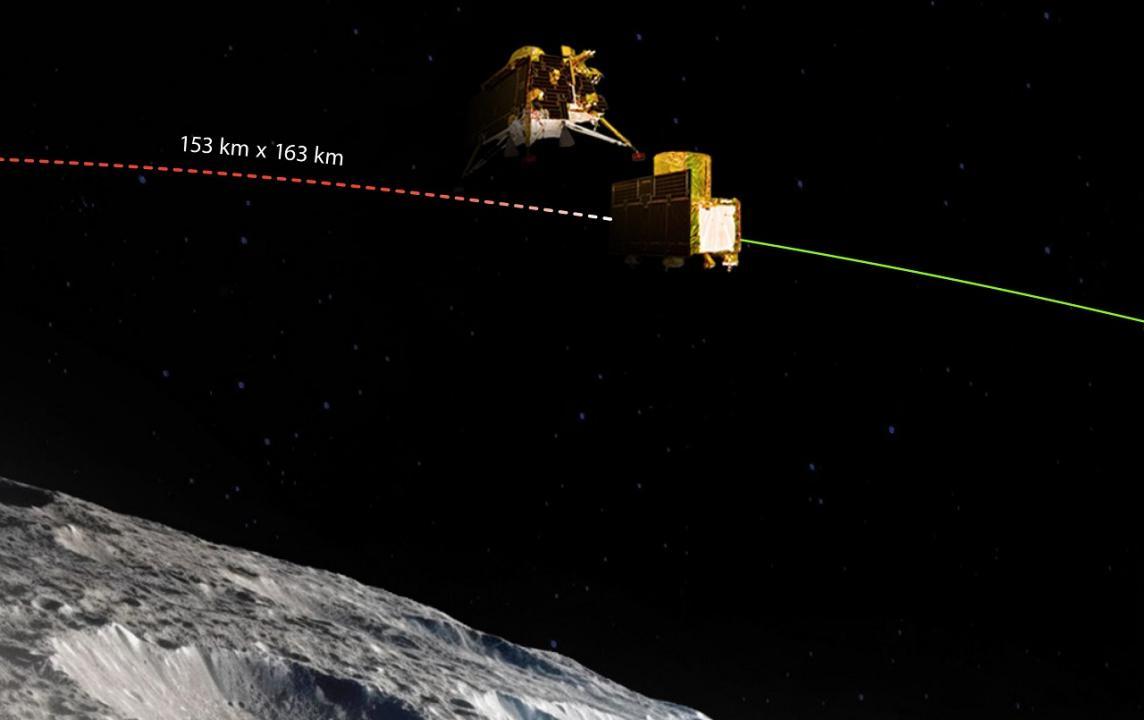The Chandrayaan-3 mission's lander is named after Vikram Sarabhai (1919-1971), who is widely regarded as the father of the Indian space programme

Pic/PTI
Chandrayaan-3's Vikram lander is set to undergo a crucial deboosting manoeuvre on Friday after successfully getting separated from the propulsion module a day before.
ADVERTISEMENT
The deboosting manoeuvre is scheduled today at around 1600 IST.
Deboosting is the process of slowing down to position itself in an orbit where the orbit's closest point to the Moon (Perilune) is 30 km and the farthest point (the Apolune) is 100 km.
"The next Lander Module (Deorbit 1) manoeuvre is scheduled for tomorrow (August 18, 2023) around 1600 hrs IST," ISRO posted on X (formerly Twitter) yesterday while announcing the successful separation of the lander from the propulsion module.
The Chandrayaan-3 mission's lander is named after Vikram Sarabhai (1919-1971), who is widely regarded as the father of the Indian space programme.
On Wednesday, the spacecraft carried out the final lunar-bound orbit reduction manoeuvre of the Chandrayaan-3 spacecraft, a week ahead of its scheduled landing on the south pole of the moon on August 23.
A GSLV Mark 3 (LVM 3) heavy-lift launch vehicle was used for the launch of the spacecraft that was placed in the lunar orbit on August 5 and since then it has been through a series of orbital manoeuvres.
It has been a month and three days since the Indian Space Research Organisation launched the Chandrayaan-3 mission on July 14. The spacecraft was launched from the Satish Dhawan Space Centre in Andhra Pradesh's Sriharikota.
ISRO is bidding to make a successful soft landing on the moon, which will make India the fourth country in the world to achieve the feat after the United States, Russia, and China.
The stated objectives of Chandrayaan-3, India's third lunar mission, are safe and soft landing, rover roving on the moon's surface, and in-situ scientific experiments.
The approved cost of Chandrayaan-3 is Rs 250 crores (excluding launch vehicle cost).
Chandrayaan-3's development phase commenced in January 2020 with the launch planned sometime in 2021. However, the COVID-19 pandemic brought an unforeseen delay to the mission's progress.
Chandrayaan-3 is the ISRO's follow-up attempt after the Chandrayaan-2 mission faced challenges during its soft landing on the lunar surface in 2019 and was eventually deemed to have failed its core mission objectives.
The key scientific outcomes from Chandrayaan-2 include the first-ever global map for lunar sodium, enhancing knowledge on crater size distribution, unambiguous detection of lunar surface water ice with IIRS instrument and more.
During the Chandrayaan-1 mission, the satellite made more than 3,400 orbits around the moon and the mission was concluded when the communication with the spacecraft was lost on August 29, 2009, according to the Indian Space Research Organisation (ISRO).
Meanwhile, the Chairman of the Indian Space Research Organisation (ISRO), S Somanath last week expressed confidence in the progress of the Chandrayaan 3, providing reassurance that all systems were operating as planned.
Chairman S Somanath stated, "Everything is going fine now. There will be a series of manoeuvres until it lands (on the Moon) on 23rd August. The satellite is healthy."
Moon serves as a repository of the Earth's past and a successful lunar mission by India will help enhance life on Earth while also enabling it to explore the rest of the solar system and beyond.
Historically, spacecraft missions to the Moon have primarily targeted the equatorial region due to its favourable terrain and operating conditions. However, the lunar south pole presents a vastly different and more challenging terrain compared to the equatorial region.
This story has been sourced from a third party syndicated feed, agencies. Mid-day accepts no responsibility or liability for its dependability, trustworthiness, reliability and data of the text. Mid-day management/mid-day.com reserves the sole right to alter, delete or remove (without notice) the content in its absolute discretion for any reason whatsoever.
 Subscribe today by clicking the link and stay updated with the latest news!" Click here!
Subscribe today by clicking the link and stay updated with the latest news!" Click here!







